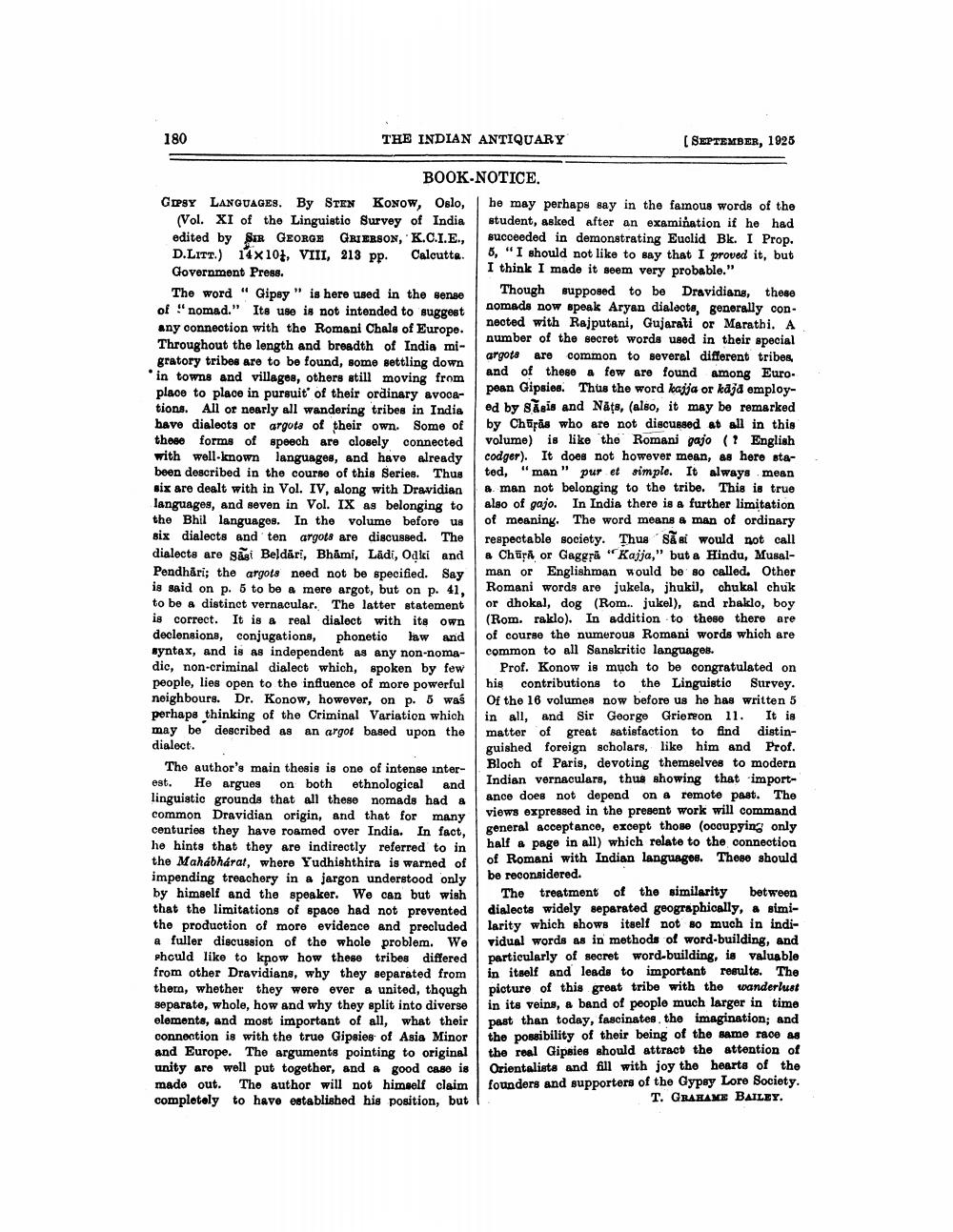________________
180
THE INDIAN ANTIQUARY
SEPTEMBER, 1025
BOOK-NOTICE. Gipsy LANGUAGES. BY STEN Konow, Oslo, he may perhaps say in the famous words of the
(Vol. XI of the Linguistic Survey of India student, asked after an examination if he had edited by SIR GEORGE GRIERSON, K.C.I.E., succeeded in demonstrating Euclid Bk. I Prop. D.LITT.) 14x108, VIII, 213 pp. Calcutta.
5, "I should not like to say that I proved it, but Government Press.
I think I made it seem very probable." The word " Gipsy" is here used in the sense
Though supposed to be Dravidians, these of " nomad." Its use is not intended to suggest
nomads now speak Aryan dialecte, generally conany connection with the Romani Chals of Europe.
nected with Rajputani, Gujarati or Marathi. A Throughout the length and breadth of India mi
number of the secret words used in their special gratory tribes are to be found, some settling down
argons are common to several different tribes, in towns and villages, others still moving from
and of these a few are found among Euro. place to place in pursuit of their ordinary avoca
pean Gipsies. Thus the word kajja or kdjd employtions. All or noarly all wandering tribes in India ed by Sagis and Nats, (also, it may be remarked have dialoots or argota of their own. Some of by Chürås who are not discussed at all in this these forms of speech are closely connected volume) 18 like the Roman pajo ( English with well-known languages, and have already
codger). It does not however mean, as hero stabeen described in the course of this series. Thus
ted, "man" pur et simple. It always mean six are dealt with in Vol. IV, along with Dravidian & man not belonging to the tribe. This is true languages, and seven in Vol. IX as belonging to also of gajo. In India there is a further limitation the Bhil languages. In the volume before us of meaning. The word means a man of ordinary six dialects and ten argots are discussed. The respectable society. Thus sai would not call dialects are gasi Beldări, Bhami, Ladi, Oaki and & Chāpå or Gagesā "Kajja," but a Hindu, MusalPendhari; the argots need not be specified. Say man or Englishman would be so called. Other is said on p. 5 to be a mere argot, but on p. 41, Romani words are jukela, jhukil, chukal chuk to be a distinct vernacular. The latter statement or dhokal, dog (Rom.. jukel), and rhaklo, boy is correct. It is a real dialect with its own (Rom. raklo). In addition to those there are declensions, conjugations, phonetio law and of course the numerous Romani words which are syntax, and is as independent as any non-noma- common to all Sanskritio languages. dic, non-criminal dialect which, spoken by few Prof. Konow is much to be congratulated on people, lies open to the influence of more powerful his contributions to the Linguistio Survey. neighbours. Dr. Konow, however, on p. 6 was Of the 16 volumea now before us he has written 5 perhaps thinking of the Criminal Variation which in all, and Sir George Grieron 11. It is may be described as an argot based upon the matter of great satisfaction to find distindialect.
guished foreign scholars, like him and Prof. The author's main thesis is one of intense inter
Bloch of Paris, devoting themselves to modern est. He argues on both ethnological and
Indian vernaculars, thus showing that importlinguistic grounds that all these nomads had a
ance does not depend on a remote past. The common Dravidian origin, and that for many
views expressed in the present work will command centuries they have roamed over India. In fact,
general acceptance, except those (occupying only ho hints that they are indirectly referred to in
half a page in all) which relate to the connection the Mahabharat, where Yudhishthira is warned of
of Romani with Indian languages. These should impending treachery in a jargon understood only
be reconsidered. by himself and the speaker. We can but wish The treatment of the similarity between that the limitations of space had not prevented
dialects widely separated geographically, a simithe production of more evidence and precluded larity which shows itself not so much in india fullor discussion of the whole problem. We vidual words as in methods of word-building, and phould like to know how these tribes differed particularly of secret word-building, is valuable from other Dravidians, why they separated from in itself and leads to important resulte. The thorn, whether they were ever a united, though picture of this great tribe with the wanderlust separato, whole, how and why they split into diverse in its veins, a band of peoplo much larger in time elements, and most important of all, what their past than today, fascinates the imagination; and connection is with the true Gipsies of Asia Minor the possibility of their being of the same race as and Europe. The arguments pointing to original the real Gipsies should attract the attention of unity are well put together, and a good case is Orientalists and fill with joy the hearts of the made out. The author will not himself claim founders and supporters of the Gypsy Lore Society. completely to have established his position, but I
T. GRAHAME BAILEY.




